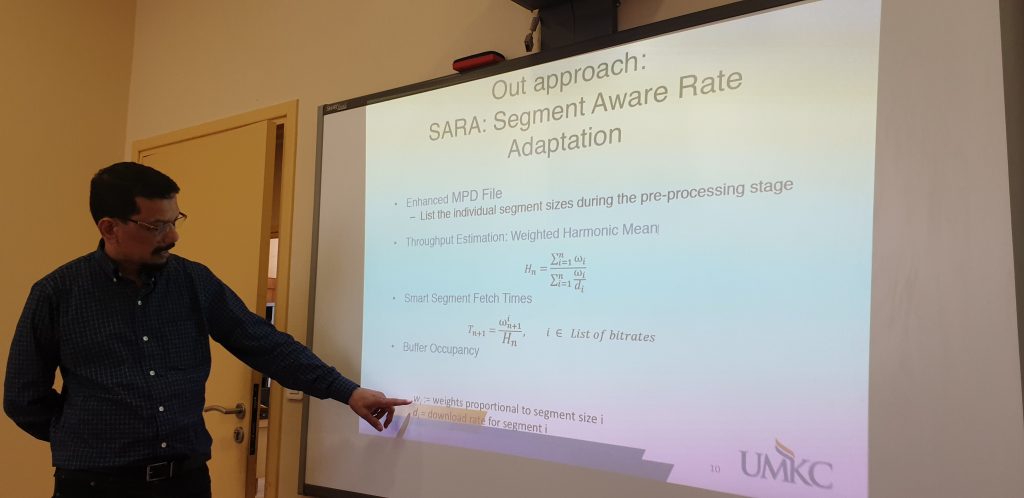Speaker: Deep Medhi, National Science Foundation
Title: Quality of Experience with Video and Immersive Content Delivery
Salle 33.1.19 – Cnam, 2 rue Conté
June 11, 2019 – 14h-15h
Abstract
Dynamic adaptive streaming over HTTP (DASH) based streaming is becoming the most popular online video streaming technique. DASH streaming provides seamless playback by adapting the video quality to the network conditions during the video playback. A DASH server supports adaptive streaming by hosting multiple representations of the video and each representation is divided into small segments of equal playback duration. At the client end, the video player uses an adaptive bitrate selection (ABR) algorithm to decide the bitrate to be selected for each segment depending on the current network conditions. Netflix currently uses DASH for movie viewing to end users. In this talk, we will cover two aspects. In the first part, I’ll present a segment-aware rate adaptation (SARA) algorithm that considers the segment size variation in addition to the estimated path bandwidth and the current buffer occupancy to accurately predict the time required to download the next segment for better quality of experience (QoE). I’ll also discuss its implementation on mobile clients and performance results. In the second part, I’ll discuss emerging immersive contents (such as 360-degree video) that require a tile-based approach for QoE and its implication on contentions as multiple connections may be required, and how a software-defined networking approach using application-aware networking may be used to improve performance. Finally, I’ll discuss theoretical issues with such applications that require multiple TCP connections that compete with typical web applications. The talk will start with a brief outline on NSF’s Computer & Network Systems Division’s activities.
Bio:
Deep Medhi is a Program Director in the Computer & Network Systems (CNS) Division at National Science Foundation since August 2018. He manages networking research in the Networking Technologies and Systems (NeTS) program in CNS as well as several infrastructure programs such as NSF Future Cloud, Mid-Scale Research Infrastructure, and Cloud Access. He is on leave as Curators’ Distinguished Professor in the Department of Computer Science and Electrical Engineering at the University of Missouri-Kansas City (UMKC) under the IPA program. He received B.Sc. in Mathematics from Cotton College, Gauhati University, India, M.Sc. in Mathematics from St. Stephen’s College, University of Delhi, India, and his M.S. and Ph.D. in Computer Sciences from the University of Wisconsin-Madison, USA. Prior to joining UMKC in 1989, he was a member of the technical staff at AT&T Bell Laboratories where he worked on traffic network routing and design. His research interests are in network resilience, network routing and optimization, traffic engineering and design, network managment, data center networking, and video quality-of-experience. He co-authored the books, “Routing, Flow, and Capacity Design in Communication and Computer Networks” (2004) and “Network Routing: Algorithms, Protocols, and Architectures” (1st edition, 2007; 2nd edition, 2017), both published by Morgan Kauffman/Elsevier. He is a Fellow of the Institute of Electrical and Electronics Engineers (IEEE).


